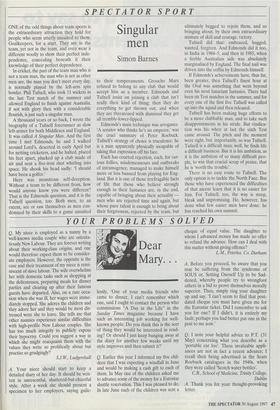SPECTATOR SPORT
Singular men
Simon Barnes
ONE of the odd things about team sports is the extraordinary attraction they hold for people who seem utterly unsuited to them. Goalkeepers, for a start. They are in the team, yet not in the team, and even wear a different woolly to show their perfect inde- pendence, concealing beneath it their knowledge of their perfect dependence.
In cricket, the part of the team man who is not a team man, the man who is not as other men are, the man you don't meet every day, is normally played by the left-arm spin bowler. Phil Tufnell, who took 11 wickets in the last Test match of the summer and allowed England to finish against Australia, if not with glory then with a considerable flourish, is just such a singular man.
A thousand years or so back, I wrote the biography of a Tufnell forerunner as slow left-armer for both Middlesex and England. It was called A Singular Man. And the first time I met Edmonds, he and I walked around Lord's, deserted in early April but for netting cricketers, and he halted, placed his feet apart, plucked up a club made of air and sent a five-iron shot whirling into space. He shook his head sadly: 'I should have been a golfer.'
Here was monstrous self-deception. Without a team to be different from, how would anyone know you were different? That is the Edmonds question, and it is the Tufnell question, too. Both men, to an extent, see or saw themselves as men con- demned by their skills to a game unsuited to their temperaments. Groucho Marx refused to belong to any club that would accept him as a member. Edmonds and Tufnell insist on joining a club that isn't really their kind of thing; then they do everything to get thrown out, and when they are threatened with dismissal they get all trembly-lower-lipped.
Edmonds's main technique was arrogance. `A senator who thinks he's an emperor,' was the cruel summary of Peter Roebuck. Tufnell's strategy of choice is truculence: he is a man apparently physically incapable of taking that expression off his face.
Each has courted rejection, each, for var- ious follies, misdemeanours and outbreaks of intransigence, managed to make himself more or less banned from playing for Eng- land. But it is one of those irrefragable facts of life that those who believe strongly enough in their fantasies are, in the end, capable of bringing about their actuality men who are rejected time and again, but whose pure talent is enough to bring about their forgiveness, rejected by the team, but ultimately begged to rejoin them, and so bringing about, by their own extraordinary mixture of skill and courage, victory.
Tufnell did that: embraced, hugged, wanted, forgiven. And Edmonds did it too, in India in 1984-5, and then in 1985, when a feeble Australian side was absolutely marginalised by England. The final nail was driven into the coffin by Edmonds himself.
If Edmonds's achievements have, thus far, been greater, then Tufnell's finest hour at the Oval was something that went beyond even his most luxuriant fantasies. There had been six Test matches in the summer, and for every one of the first five Tufnell was called up into the squad and then released.
Tufnell has been making huge efforts to be a more clubbable man, and to take such disappointments in his stride. But vindica- tion was his when at last the sixth Test came around. The pitch and the moment were right, but, importantly, so was Tufnell. Tufnell is a difficult man; well, he finds life a difficult business. But it is his ambition, as it is the ambition of so many difficult peo- ple, to win that crucial scrap of praise, that he is 'worth the trouble'.
There is no easy route to Tufnell. The only option is to tackle the North Face. But those who have experienced the difficulties of that ascent learn that it is no easier for him. For Tufnell, too, the way is steep, bleak and unpromising. He, however, has done what few easier men have done: he has reached his own summit.


















































 Previous page
Previous page